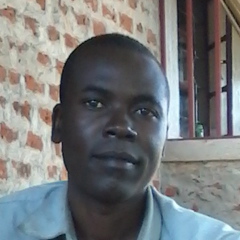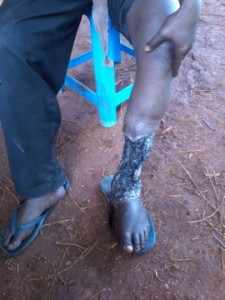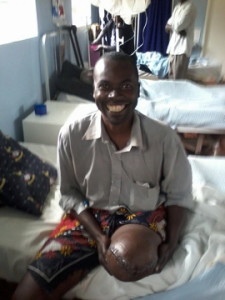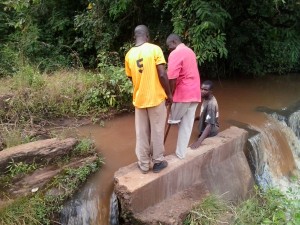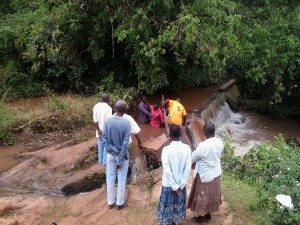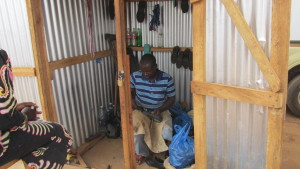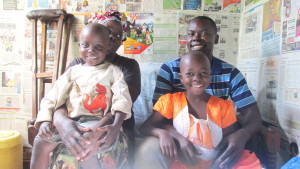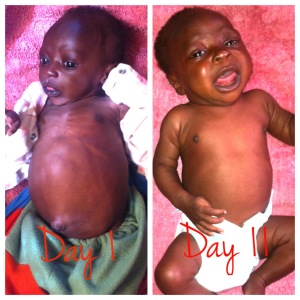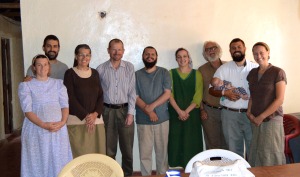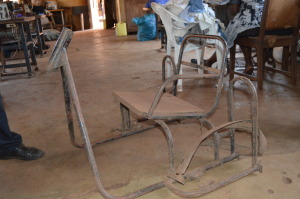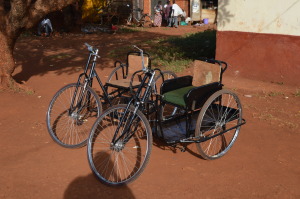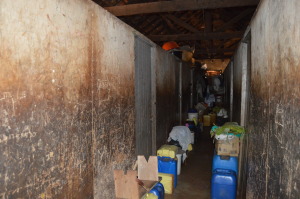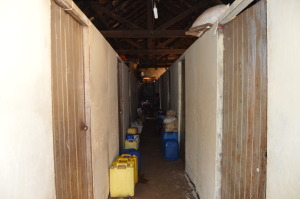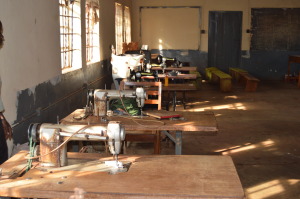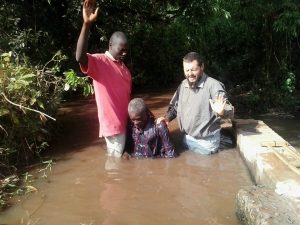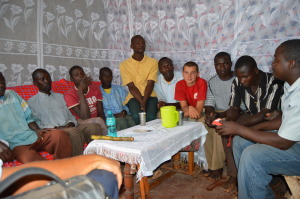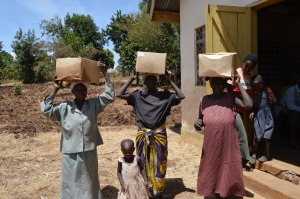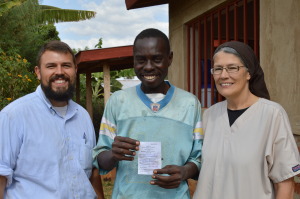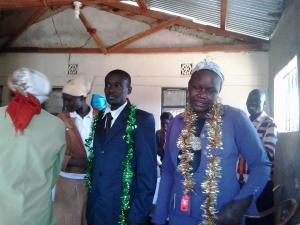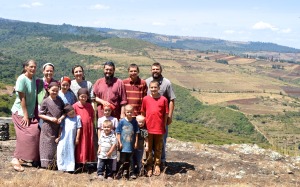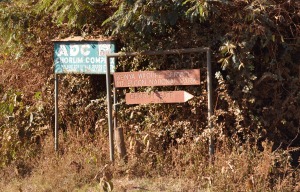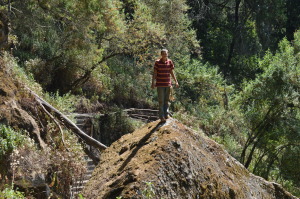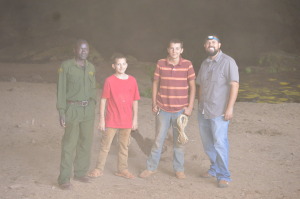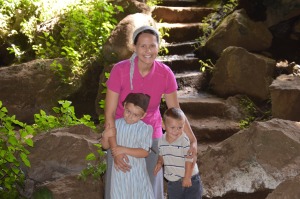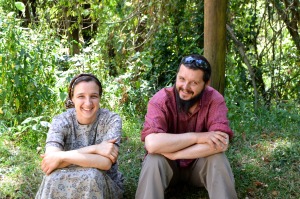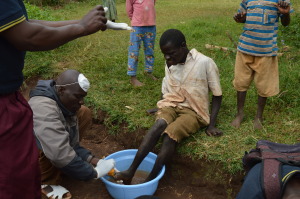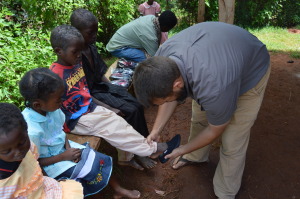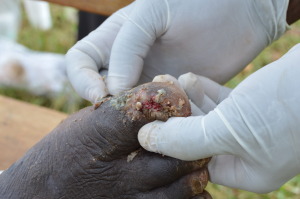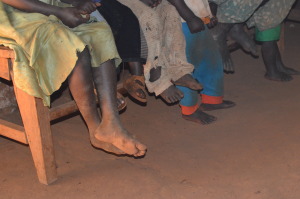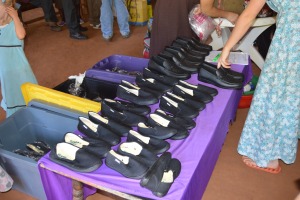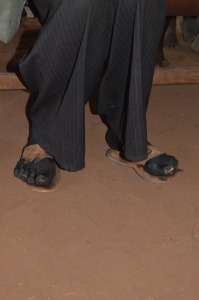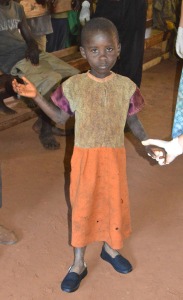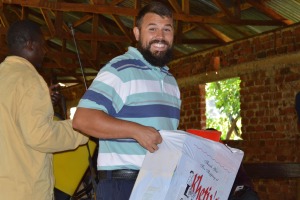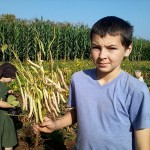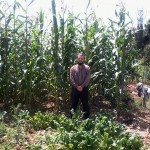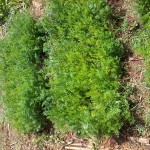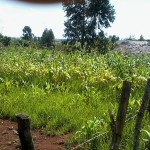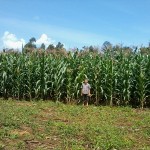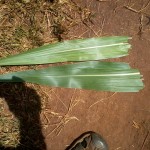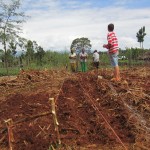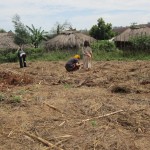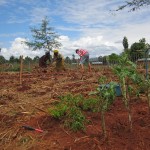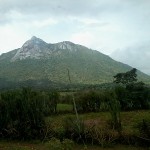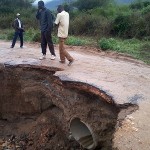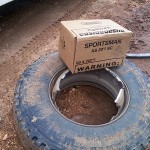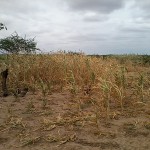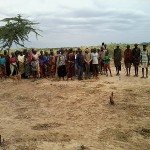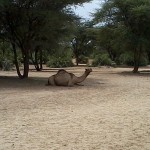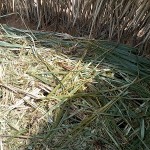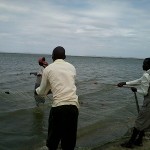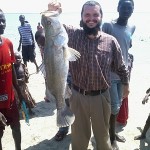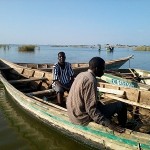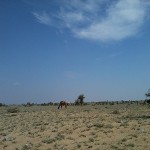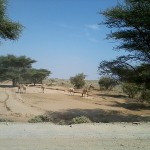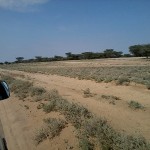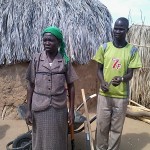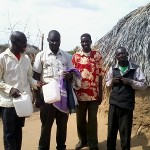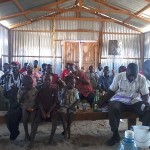Two missionaries named Michael and Robert were packing to go overseas to plant churches. They wanted to put everything in the bag that they would need to plant churches (symbolically, that is). So they proceeded to pack for the adventure.
Michael said to Robert: “A Bible, we will need a Bible to plant churches.”
Robert answered: “Yes, put it in the bag.”
Michael pulled a plan for a church building from a folder and showed Robert. Then he said: “We will need a church building to plant a church. It will take purchasing property, getting permits, and getting a contractor to build the structure.”
Robert replied: “Yes, of course. We can’t plant churches without a ‘church.’ Put it in the bag.”
Michael then showed him a brochure of a bunch of fancy audiovisual equipment. He said: “We will want to show the Jesus film and do crusades to save people and get many members for our new church. We will need much expensive equipment to attract large crowds.”
Robert responded: “Yes, I love these speakers—and what a great projector. Put it in the bag.”
Michael then pulled out a couple resumes for prospective pastors. “We will need a strong pastor to launch this church. Look at this guy. He has a degree from a great Bible college. We will have to pay him a good salary to move out there, but he will be worth it.”
“He is perfect!” exclaimed Robert. “Put it in the bag.”
“We will need some powerful preaching to draw a good crowd,” said Michael
“And we certainly want a crowd,” said Robert.
Michael then motioned to a plan for a Bible college. “Look at this,” he said.
“Wow! I love it. That is how we will train up indigenous pastors. Put it in the bag” said Robert.
Michael opened his wallet and said, “This will cost a lot of money. But we will get the Westerners to give. They always want to support missions.”
“Put it in the bag,” said Robert.
Michael zipped up the bag and lifted it, firmly bracing himself, so as not to fall. He handed it over to Robert and he nearly fell due to the great weight of the bag.
Robert commented, “This bag is real heavy. Do you think it will work?”
Michael replied, “This is how we do it, and it works for us.”
Weeks later they boarded a plane for East Nowhere and set off to the field. In the field, they encountered Wanyonyi on the side of the road on a path. They introduced themselves as missionaries and told him they had a gift for him from God.
Wanyonyi replied, “Are you sure it is for me?”
They handed him the bag and it nearly crushed him. Wanyonyi got up and was furious and chased them away. Michael and Robert barely escaped. Disappointed from the failure of the mission, they returned home.
“What happened,” Robert said to Michael.
“I don’t know. It looked way too heavy for him,” replied Michael.
“That was really discouraging,” said Robert. “I know we have been called to plant churches. Now what do we do?”
Michael had a look on his face and twinkle in his eye as if he was granted some supernatural insight. “I have an idea. What if we simply follow the New Testament pattern for our church planting mission.”
Robert responded in delight, “yeah, that is a great idea. Because we know it worked for them!”
“That’s it then. It is settled,” exclaimed Michael. “If it is not in the New Testament, it does not go in the bag.”
The men then dumped the contents of the bag onto the table and started repacking their bag for the church planting mission with renewed hope and vigor.
Michael first grabbed the Bible and said to Robert: “A Bible, we will need a Bible to plant churches.”
Robert answered: “Yes, of course. That is our model for how we will work. Put it in the bag.”
Michael pulled a plan for a church building from a folder and showed Robert. Then he said: “We will need a church building to plant a church. I mean, we are church planting. How do you plant churches without a ‘church?’”
Robert replied: “Actually, I don’t remember seeing a church building in the New Testament.”
Michael responded in disbelief, “What do you mean no church building in the New Testament. Where did they meet?”
Robert opened to Romans 16:3-5 and read: “Greet Prisca and Aquila, my fellow workers in Christ Jesus, who for my life risked their own necks, to whom not only do I give thanks, but also all the churches of the Gentiles; also greet the church that is in their house.” Then he read 1 Corinthians 15:16: “The churches of Asia greet you. Aquila and Prisca greet you heartily in the Lord, with the church that is in their house.” Then Robert read Colossians 4:15 and Philemon 1:1-2 in rapid succession: “Greet the brethren who are in Laodicea and also Nympha and the church that is in her house… To Philemon our beloved brother and fellow worker, and to Apphia our sister, and to Archippus our fellow soldier, and to the church in your house.”
Michael stared dumbfounded and a bit humbled, “For real, there are no church buildings in the Bible. They met in houses! That is great news for the mission, because I knew the expense of the building would be a real problem. But they already have houses! Put it in the bag, brother.”
Michael started affectionately looking over the audiovisual equipment catalogs. “No, not my equipment,” exclaimed Michael, having realized the ramifications of their mutual agreement that if it is not in the New Testament, it does not go in the bag. “So now how are we going to evangelize?”
Robert responded, “In Luke 10 Jesus just sent them out in pairs—in fact, He made the point for them to go empty-handed. They preached the Kingdom of God and healed people. I mean, they were taught by the Master storyteller. Jesus showed them how to share the message of the Kingdom using simple stories.”
“You know what? That is actually much better than what we had going,” replied Michael with renewed enthusiasm.
Next, Robert grabbed the resume of the pastor they both liked, “What about the pastor? There are pastors in the Bible, aren’t there?”
“Well, that is funny you ask. Not exactly,” said Michael.
“What? You have to be kidding,” remarked Robert.
Michael clarified, “Churches certainly had leadership—even house churches. But each fellowship did not have a CEO-type running the place.”
Robert, a bit confused by Michael’s mysterious response, balked, “but pastor is one of the five-fold offices—you know—Ephesians 4:11.”
“I know, I know,” said Michael. “But all I am saying is that it was not the way we understand the role. Pastoring is synonymous with shepherding, and it was certainly a vital role. But the shepherds were discipled and trained up from the flock, and selected based on their character and how they managed their personal households. These were not seminary trained business-style leaders who were recruited and hired based on resumes.”
Robert, interested in where the conversation was heading then asked, “Well if they are trained up from the body, are you saying the church operated without a pastor at the beginning? Because I know Paul said in 1 Timothy 3 leaders should not be recent converts.”
“Precisely,” responded Michael.
“Brother, your theory sounds great,” said Robert, “But we agreed it does not go into the bag unless it is the New Testament. So prove it.”
Undaunted, Michael opened up to Titus 1 and started reading from verse 5: “For this reason I left you in Crete, that you would set in order what remains and appoint elders in every city as I directed you, namely, if any man is above reproach, the husband of one wife, having children who believe, not accused of dissipation or rebellion. For the overseer must be above reproach as God’s steward, not self-willed, not quick-tempered, not addicted to wine, not pugnacious, not fond of sordid gain, but hospitable, loving what is good, sensible, just, devout, self-controlled, holding fast the faithful word which is in accordance with the teaching, so that he will be able both to exhort in sound doctrine and to refute those who contradict.”
“You can’t be serious,” responded Robert. “I have read the New Testament a hundred times and I never noticed that Paul’s churches were launched leaderless. This is amazing! What a discovery. This will make launching our house churches a million times easier. All we have to do now is make disciples, organize them into fellowships, and simply disciple them until the Holy Spirit reveals the leadership. Put it in the bag, brother!”
Robert’s enthusiasm sank as he thought out loud, “Well if we don’t have a pastor, who will preach the sermons? I mean, without powerful sermons, who will come, really?”
Michael answered, “Actually, you don’t find sermons preached in the New testament either.”
“Not true, brother,” responded Robert, confident he had stumped his dear brother Michael. “What about the ‘Sermon on the Mount,’ ‘Sermon on the Plain,’ Stephen’s powerful sermon, and Peter at Pentecost? There is certainly preaching in the New Testament.”
Michael calmly explained, “There is preaching, but NOT to believers. All those examples were evangelism, not examples of sermons directed at the churches.”
“I see your point,” responded Robert. “So what did they do in the churches? Who lead the service?”
Michael answered, “They had an interactive service lead by the Holy Spirit. I mean one would teach, then another would lead a song, and they even spoke in tongues and prophesied in turn. It is right here in 1 Corinthians 14:26: let me read it, ‘What is the outcome then, brethren? When you assemble, each one has a psalm, has a teaching, has a revelation, has a tongue, has an interpretation. Let all things be done for edification.’”
“So it looks like no one person ran the show, but rather all who were so inclined participated as the Spirit lead,” noted Robert. “This takes a lot of pressure off the would-be pastor. This really sounds great. Let’s put it in the bag.”
“Another thing I noticed in reading 1 Corinthians 11, is that they shared the Lord’s table as a full meal. I mean every week. They took communion, but not a token wafer and a little sip,” said Michael. “In fact, they called it the Love Feast. This was the centerpiece of their meeting together.”
Robert feeling about three inches tall, not understanding how he could have missed these things, having received so much Bible training, replied: “brother, this is a real humbling exercise. I really never knew any of this. But I am blessed and relieved. Because I am certain the folks we are ministering to are going to love this. Put it in the bag.”
Now they looked at the plans for the Bible college together. They looked directly at each other and both realized at the same time that there is no Bible college in the Bible. So they thought of the New Testament alternative to Bible college and both blurted out at precisely the same time, “discipleship!”
Michael then quickly opened his Bible to 2 Timothy 2:2 while Robert was opening his to Luke 6:40. Michael read first: “The things which you have heard from me in the presence of many witnesses, entrust these to faithful men who will be able to teach others also.”
Then Robert read, “A pupil is not above his teacher; but everyone, after he has been fully trained, will be like his teacher.”
Michael said, “Put it in the bag, brother.”
Robert saw the last item. “Money—that is a sticky issue. What do we find in the New Testament. Church planting costs a lot. I mean we need the church building,” then quickly realizing, “oh yeah, no building.” Then he went right down the list, “pastor…no pastor, audiovisual equipment…no equipment, Bible college…no Bible college…”
Michael interrupted, “I got it, I got it…I know what we need money for.”
Robert looked confused.
Michael continued, “The Bible. We will need money for the Bible. That is the only thing we need to plant churches!”
Robert was laughing nervously, somewhat bewildered as to how such a complex endeavor as church planting could have become so simple and affordable.
Robert contemplated, “So what did the New Testament church do with their money. I mean, they took offerings, didn’t they?”
Michael, eager to answer the question, responded by reading from Acts Chapter 4 starting in verse 32: “And the congregation of those who believed were of one heart and soul; and not one of them claimed that anything belonging to him was his own, but all things were common property to them. And with great power the apostles were giving testimony to the resurrection of the Lord Jesus, and abundant grace was upon them all. For there was not a needy person among them, for all who were owners of land or houses would sell them and bring the proceeds of the sales and lay them at the apostles’ feet, and they would be distributed to each as any had need.”
When Michael finished reading, Robert answered his own question: “They simply gave to all as they had need. So the money went to the neediest among them. I am certain our new house churches will love this.”
Michael grinned, “put it in the bag.”
The next week they returned to the mission field. Both were amazed by how light the bag had grown. They both were eager to carry the bag this time, remembering how heavy it used to be.
They stumbled upon Wanyonyi again. He saw the bag and made a run for it. They caught up to him and were able to explain to him that it was different this time. This time they handed the bag slowly, and held it with Wanyonyi until he supported all the weight. Wanyonyi was shocked by how light it was.
They all praised God together and the men urged Wanyonyi to take it to his people. Wanyonyi walked away under the blue sky carrying the package to all the villages. The missionaries returned home, overjoyed by the success of their mission.

